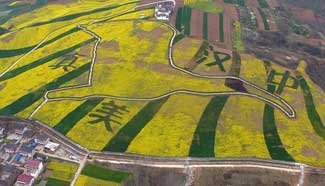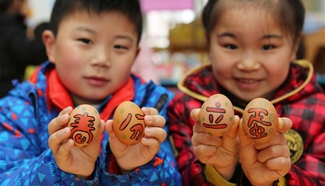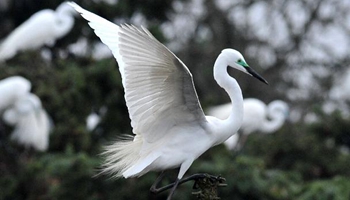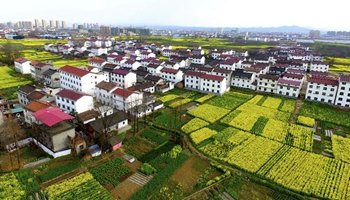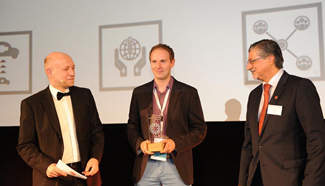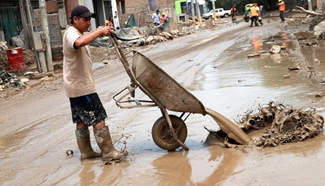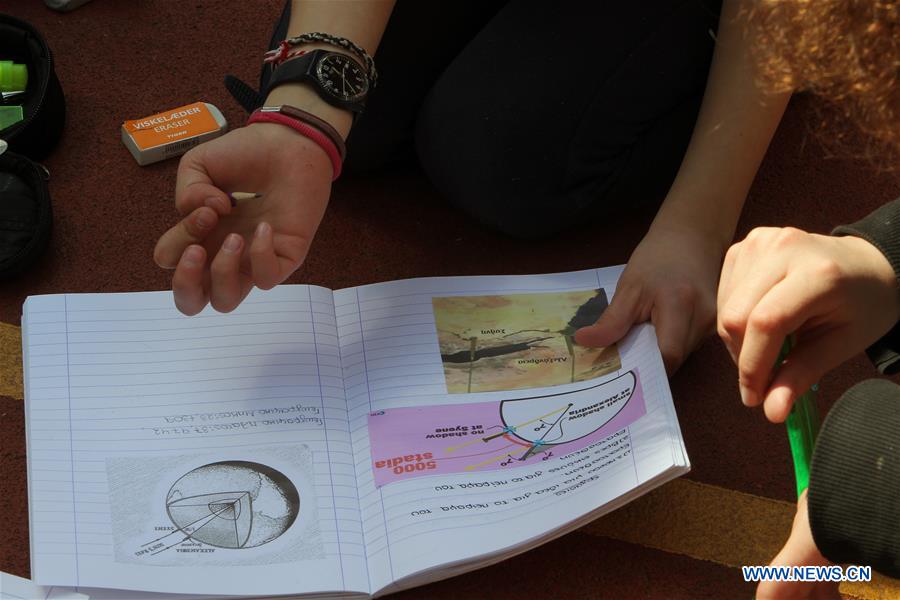
Greek students calculate the Earth's circumference at midday in Athens, Greece, March 20, 2017. Students in about 450 schools across Greece greeted on Monday the Spring Equinox which marks the beginning of the season, recalculating the Earth's circumference, repeating the experiment of the famous ancient Greek mathematician, astronomer and geographer Eratosthenes. (Xinhua/Marios Lolos)
By Maria Spiliopoulou, Valentini Anagnostopoulou
ATHENS, March 20 (Xinhua) -- Students in about 450 schools across Greece greeted on Monday the Spring Equinox which marks the beginning of the season, recalculating the Earth's circumference, repeating the experiment of the famous ancient Greek mathematician, astronomer and geographer Eratosthenes.
In a science project organized by the National Observatory of Athens, with the cooperation of Laboratory Centers of Natural Sciences in other Greek cities and the Education Ministry for the first time, pupils armed with rulers, triangles, calculators, papers and pencils left the classroom at midday to follow in the footsteps of Eratosthenes.
According to historians, in the 3rd century BC Eratosthenes (274 BC-194 BC), while serving as chief librarian at the Library of Alexandria in Egypt, became the first person to calculate the circumference of the Earth, proving that it is a sphere after reading a papyrus.
The scientist read that in the city of Aswan near the tropic of the Cancer on a particular day, during the summer solstice on June 21, there is a well where on midday the sunlight reaches the bottom and the sun which is directly overhead is reflected on the water.
He knew that in Alexandria there was no day that the great Obelisk did not have a shadow.
By measuring the shadow angle at the top of the Obelisk at noon on the same day in Alexandria and taking into account the distance between the two cities using a simple mathematical formula, Eratosthenes calculated the Earth's circumference at about 40,000 kilometers. The calculation was proved remarkably accurate several centuries later.
On Monday, during the Spring Equinox when the Sun shines directly on the equator and the length of day and night is nearly equal, hundreds of Greek students repeated the experiment.
The main goal was to show students that sometimes just by using simple tools and their brains they can make significant discoveries.
Tina Nantsou teaches Physics at Hill School in Athens for the past two decades. It was the third year she urged her 70 pupils aged 10-12 to repeat the experiment.
After narrating to the children the story of Eratosthenes and showing videos in the classroom she asked her students to read further and be prepared for Monday's great experiment. Not all kids made correct calculations, but she does not mind.
"For us it is important that children are free in this process. We do not care if mistakes are made. We want to think about what went wrong afterwards. Through this process of making mistakes they will understand which is the meaning of experimenting," she told Xinhua.
"Physics is clearly a science based on experiment. In my opinion without experimenting one cannot learn Physics. Today it was most likely the first time that kids noticed that the shadow is moving. Although it constantly happens every day, maybe they have never noticed it," she added.
Dimitris Tsimpidas, an astrophysicist at the National Observatory of Athens which is situated atop a hill with a view of the Acropolis, welcomes children and adults and explains with simple terms the "miracles of our universe."
On Monday he supervised pupils who repeated Eratosthenes experiment at the National Observatory and talked to Xinhua about its significance.
"The experiment is simple and is included in the top ten of the most beautiful experiments in Physics... It is so simple that it helps participants, in particular children, to learn to think starting with simple thoughts and realize that perhaps the solutions to major problems can be found in simple ideas," he said.
Pupils of Hill School who participated in Monday's project were overenthusiastic.
"It is impressive that Eratosthenes thought about this in the 3rd century BC and it is so nice... I really like Physics experiments and I enjoy taking part in," Spiros Floris told Xinhua.
Asked why he is so impressed with the ancient scientist's accomplishment, Jason Alikos said, "because Eratosthenes thought about this, using his mind and because it was in the third century BC and they had no GPS or satellites, nothing."
Assi Zeva explained that her classmates were excited because the ancient mathematician showed that a simple idea of a bright person who is asking questions and seeking answers can change the world. They were more excited when they found out that they can also do it.
"If I had read this papyrus I would not have been so impressed. It is impressive that he had a flash of genius and asked himself why is this happening, while an ordinary man would quickly move forward and not give it a second thought... I like the fact that you can not only sit back studying a book, but you make the experiments yourself and have results," she told Xinhua.



